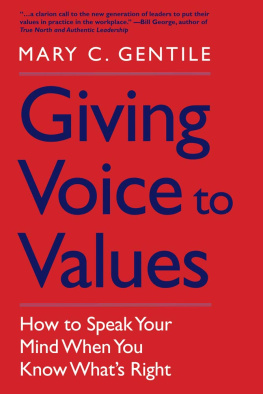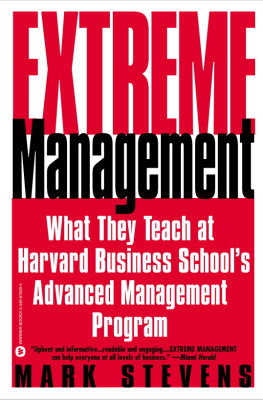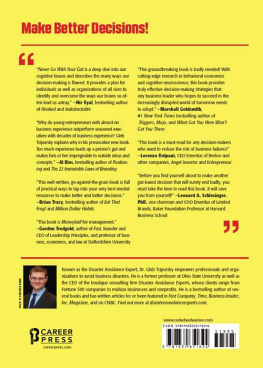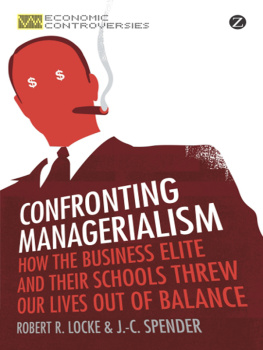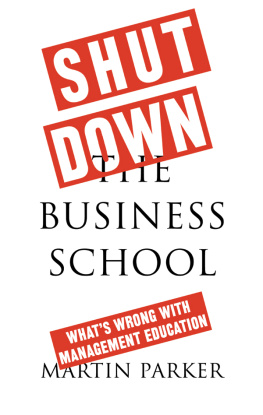More Praise for Giving Voice to Values
Mary Gentile has responded to the cries of business and business school critics by shifting our attention from debating right versus wrong and right versus right to acting on the questions these dilemmas raise. This is the most significant contribution to business ethics I have experienced in my professional career. It is destined to shape the behavior of future generations in ways that should make us all much prouder of business as an entity and management as a career.
Leonard A. Schlesinger, president, Babson College
I can think of no better way to take ethics out of the realm of pure philosophical discussion. Giving Voice to Values identifies whats stopping us from acting on the values we feel strongly about. It gives us the tools, the courage, and the understanding to be our better selves in even the stickiest business situation.
Ira Millstein, senior partner, Weil, Gotshal, & Manges; senior associate dean for corporate governance and the Eugene F. Williams Jr. Visiting Professor for Competitive Enterprise and Strategy, Yale School of Management
China as a nation, Chinese corporations, and individual Chinese leaders are all facing a midlife crisis. They are soul searching to decide which way to go for the next stage. They are adults, and adults learn best from their own experience and the experiences of their peers. Nobody can dictate or preach to a successful entrepreneur; their best teacher is their heart, full of wisdom from streetfight experience. All they need is to crystallize their internal values through a process of external expression. Giving Voice to Values is doing just that and that is exactly what China needs. Launching GVV in China will be a striking success, and it will be critical to Chinas continued success.
Dr. Morley C. Su, president of Millennium Capital Services, a leading climate change solutions provider in China
Giving Voice to Values is exactly what we need to help us all to take action. We know that knowing does not lead to doing. This initiative empowers us to speak through our actions.
Carolyn Woo, Martin J. Gillen Dean, Ray and Milann Siegfried Chair in Entrepreneurial Studies, Notre Dame Mendoza College of Business
Giving Voice to Values promises to be a major step forward in enabling people to deal effectively with the inevitable challenges to their integrity and ethical valueschallenges they will face in both their working and personal lives.
Michael C. Jensen, Jesse Isidor Straus Professor of Business Emeritus, Harvard Business School
Ethical dilemmas in business often are met with silencenot because the right answers were unknown, but because the right conversation wasnt initiated. Giving Voice to Values is a tool to give us all the push we need to stay true to our values and moral compass in the face of the day-to-day challenges of life and business.
David Langstaff, chairman, board of directors, TASC, Inc.; founder and former CEO, Veridian Corporation
I have to tell you I am an immediate enthusiastic supporter. Giving people the behavioral repertoire to show moral courage is a forehead-slapping idea. Why didnt I think of that?
Milton R. Blood, Ph.D., Center for International Studies, University of Missouri, St. Louis
Praise from global educators who have used the Giving Voice to Values approach can be found at www.GivingVoiceToValues.org, along with the companion curriculum.
Giving Voice to Values
MARY C. GENTILE
Giving
Voice to
Values
How to Speak
Your Mind When You
Know Whats Right
Yale
UNIVERSITY
PRESS
New Haven and London
Published with assistance from the Louis Stern Memorial Fund.
The Preface is reprinted, with revision, from the February 5, 2009, issue of BusinessWeek by special permission, copyright 2010 by The McGraw-Hill Companies, Inc.
Copyright 2010 by Mary C. Gentile.
All rights reserved.
This book may not be reproduced, in whole or in part, including illustrations, in any form (beyond that copying permitted by Sections 107 and 108 of the U.S. Copyright Law and except by reviewers for the public press), without written permission from the publishers.
Designed by Sonia Shannon
Set in Minion by Integrated Publishing Solutions
Printed in the United States of America by Sheridan Books,
Ann Arbor, Michigan.
Library of Congress Cataloging-in-Publication Data
Gentile, Mary C.
Giving voice to values : how to speak your mind when you know whats right / Mary C. Gentile.
p. cm.
Includes bibliographical references and index.
ISBN 978-0-300-16118-2 (alk. paper)
1. Business ethics. 2. Leadership. 3. Values. I. Title.
HF5387.G464 2010
174dc22 2010011905
A catalogue record for this book is available from the British Library.
This paper meets the requirements of ANSI/NISO Z39.481992 (Permanence of Paper).
10 9 8 7 6 5 4 3 2 1
To all those who would like to voice their values
rather than wonder whether they can
Preface
MISSING THE FOREST FOR THE BAD APPLES
Whether you were among those who lauded the clarity of President Barack Obamas Inaugural Address in 2009 or those who bemoaned its lack of quotable quotes, you most likely heard his call for an era of responsibility loud and clear. In fact, when he turned to the topic of greatest concern for the electoratethe economic downturnhe plainly stated that the nations woes were the result not only of greed and irresponsibility on the parts of some but also, and more important for the path out of this mess, of the collective failure to make hard choices by the rest of us.
The credit market meltdown and governance misbehavior had, once again, triggered conversations among business leaders, business educators, and the business press about just what they were communicating and teaching in the halls of industry, in corporate training seminars, and in business schools. After all, you didnt have to look far to find a lot of highly trained and highly placed managers doing a perp walk. Even more disconcerting were all those business school graduates who may not have crossed the legal line but who had presided over, or at least given silent assent to, a stream of decisions that led to the collapsing dominoes of the worldwide financial system.
What we cannot afford, however, is for businesses and business education to respond to this internal and external critique in the same way we have responded to scandals in the past. It is no longer acceptable to merely bemoan the problem of a few bad apples and then focus on preparing future business leaders to develop awareness of the kinds of ethical breaches they might encounter in their careerspresumably so they can recognize them in time to choose not to work for those bad actors and thereby avoid the problem.
The other most common approach is to focus on the difficulty of reasoning our way through knotty and challenging ethical dilemmas where the answers are not black and white but many shades of gray. The focus is on those big, thorny issues where reasonable and intelligent people of goodwill may quite understandably disagree, and often do. These case studies can trigger what one Harvard professor called ethics fatigue. The training and educational focus is on analysis and the ethical reasoning models that philosophers have probed for centuries: duty-based decision making, rights-based decision making, utilitarian decision making, and so on.
Unfortunately, whether future managers find such discussions intellectually engaging or tedious and irrelevant, too often all they learn is how to frame an argument to justify virtually any position no matter how cynical or self-serving. Utilitarianism, after all, is tailor-made for a free-market economy. I remember one CEO who told me that while interviewing a recent MBA graduate for a job, he asked the man whether he had taken a course in business ethics. When the interviewee answered yes, the CEO asked him what he had learned. The job candidate explained that he had learned about all the models of ethical analysisdeontology, virtue ethics, consequentialism, and so onand that whenever he encountered a conflict, he could decide what he wanted to do and then select the model of ethical reasoning that would best support his choice. Needless to say, this was probably not the intended lesson of the class.

